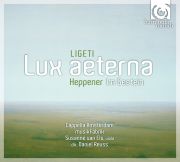|
Ligeti in 1966 was a composer on the brink. Ten years earlier, he had fled his native Hungary for a West Germany in which, with the alacrity of an exile needing to belong, he aligned himself with a postwar avant-garde of musical modernism. But belonging never came easily for Ligeti. By 1960 he had published, in the avant-garde’s ‘house journal’ die Reihe, two prominently noticed articles which were part analysis and part critique of the work of his new colleagues.
Unlike Xenakis, who had expressed similar theoretical reservations about serialism and whose compositional approach in the later 1950s also bore points of similarity with his own, Ligeti was observing from within. He was friendly with Stockhausen, with whom he had lodged upon arriving in Cologne, and – again unlike Xenakis – had been allowed to work in the electronic studio there. Indeed, it was an attitude inspired by the experience of electronically manipulating tiny details into large masses of sound that began in the following decade to seem to many composers like the most promising alternative to serialism.
[...]
© 2008 John Fallas
from the booklet notes to György Ligeti: Lux aeterna – choral & chamber works (Harmonia Mundi HMC901985)
see also separate programme note for Lux aeterna
for more information, to reproduce any material from this website, or to commission new articles or programme notes, please contact jfallas @ worldisnow . co . uk (no spaces) |
|

![]() |